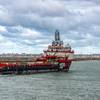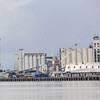As of February 7, Salvors were still racing against the weather to pump the remaining gasoline from the damaged tanker Castor before excessive swells make the operation too dangerous. The tanker has been refused refuge by several Mediterranean countries because of fears its gasoline cargo could explode. "They're pumping like mad," the Athenian Sea Carriers spokesman said. "It's a race to complete the operation by the evening."
The transfer operation commenced at 1000 GMT on Tuesday, when the 17,000 ton tanker Yapi came alongside the Castor, which has 20-m crack across its deck, he said. It is taking place 90 miles southwest of Malta.
A spokesman for the Greek salvage contractors, Tsavliris, said: "We should be finished by midnight today, weather permitting. The weather at present is okay." Other sources indicated the region is experiencing westerly winds, which are expected to pick up towards the end of the day.
Storms last week hampered the operation. At one point winds were force 12 and the swells eight meters high, said Athenian Sea Carriers, adding that survival of damaged tanker was a testament top its strength.
Tsavliris said it would wait for instructions from the owner before deciding where to tow the vessel, but sources said that once it had been freed of gasoline vapor it would probably sail in ballast to Piraeus.
The Castor developed the crack in its deck on New Year's day while en route from the Black Sea to Lagos.
In the following days it was denied refuge by Morocco, Spain and Gibraltar, amid fears of an explosion risk. But without access to shelted waters the salvage operation has been impossible until now.
The crisis has brought calls from the shipping industry for official ports of refuge for stricken ships and has forced shipping's legislative body, the IMO, to tackle the issue. - (Reuters)
Featured videos

Unlock Onboard Data Efficiencies

Inmarsat Enhances Service to Drive Digitalization

Tracking Foreign Vessels Working in the U.S. Jones Act Market
Subscribe for
Maritime Reporter E-News
Maritime Reporter E-News is the maritime industry's largest circulation and most authoritative ENews Service, delivered to your Email five times per week









